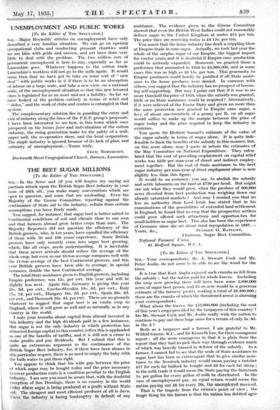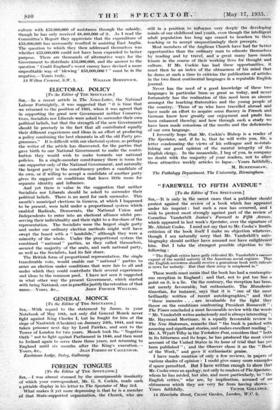[To the Editor of THE SPECTATOR.] SIR,—Your correspondents, Mr. J.
Stewart Cook and Mr. Peter Joslin, do not seem to be able to see the wood for the trees.
It is true that. East Anglia enjoyed such crumbs as fell from the subsidy ; but the nation paid for whole loaves. Including
the crop now growing there will have been some 2,800,000 acres of sugar beet grown, and £3 an acre would be a generous estimate of the farmers' profits. making a total of. 18,400,000; those are the crumbs of which the threatened arrest is alarming your correspondents.
What about the loaves, the 153,000,000 (including the cost of this year's crop) provided by the taxpayers of this country.? Do Mr. Stewart Cook and Mr. Joslin really wish the nation to continue to pay out these huge sums for a return of only 3s. 4d. in the 1 ?
Both as a taxpayer and a farmer, I am grateful to Mr. Wilfrid Greene, K.C., and Sir Kenneth Lee, for their courageous report ; all the more courageous in that it is plain from the report that they hid to pick their way through evidence much of which was heavily biassed in. defence of the subsidy. As a farmer, I cannot fail to see that the scale of State assistance to Sugar beet has been so extravagant that to give similar assis- tance to the livestock industry would mean paying a butcher £17 for each fat bullock he bought and 23 for each fat Sheep ; in the milk trade it would mean the State paying the dairyman la *per gallon for every gallon of milk he distributed. In the case of unemployment pay, an equal return would mean the nation 'paying out £6 for every 20s. the unemployed reeeived.
That is the tragedy from the citizen's point of view ; the tragic thing for the farmer is that the nation has debited agri-
culture with £53,000,000 of assistance through the. subsidy, though he has only received £8,400,000 of it. As I read the Committee's Report they appreciate that the expenditure of £53,000,000 has necessarily resulted in assisting East Anglia. The question to which they then addressed theniselves was whether £53,000,000 could not have been expended- to better • purpose. There are thousands of alternative ways for the - Government to distribute £53,000,000, and the answer to the question " Could England's worst enemy have devised a more unprofitable way of blewing ' 153,000,000 Y " must be in the negative.—Yours truly,











































 Previous page
Previous page